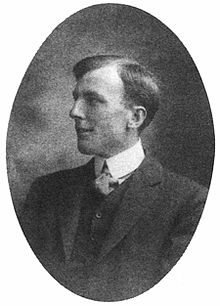| Osbert Crawford |
|---|
 |
| Información personal |
|---|
| Nombre de nacimiento |
Osbert Guy Stanhope Crawford  |
|---|
| Nombre en inglés |
O. G. S. Crawford  |
|---|
| Nacimiento |
28 de octubre de 1886 
Bombay (Raj británico)  |
|---|
| Fallecimiento |
28 de noviembre de 1957  (71 años) (71 años)
Nursling (Hampshire, Reino Unido)  |
|---|
| Nacionalidad |
Británica |
|---|
| Educación |
|---|
| Educado en |
|
|---|
| Información profesional |
|---|
| Ocupación |
Antropólogo y arqueólogo  |
|---|
| Distinciones |
- Victoria Medal (1940)

|
|---|
|
Osbert Guy Stanhope Crawford, que firmaba como O.G.S. Crawford (28 de octubre de 1886 - 28 de noviembre de 1957) fue un arqueólogo británico especializado en el estudio de la Gran Bretaña prehistórica y la arqueología de Sudán. Durante la mayor parte de su carrera estuvo trabajando para la Ordnance Survey (OS), escribió varios libros sobre temas arqueológicos y fue un gran defensor de la arqueología aérea.
Biografía
Nacido en Bombay en 1886, en el conocido como Raj británico, procedía de una familia escocesa. Se trasladó a Inglaterra de pequeño y fue criado por sus tías en Londres y en Hampshire. Estudió geografía en el Keble College, en Oxford. Empleado por el filántropo Henry Wellcome, Crawford supervisó la excavación de Abu Geili en Sudán, antes de regresar a Inglaterra en los meses previos a la Primera Guerra Mundial. Durante el conflicto sirvió tanto en el London Scottish Regiment como en el Royal Flying Corps, donde estuvo involucrado en reconocimientos terrestres y aéreos a lo largo del frente occidental. Después de que una lesión forzase un período de convalecencia en Inglaterra, regresó al frente occidental, donde fue capturado por el ejército alemán en 1918 y hecho prisionero hasta el final del conflicto.
Sus más importantes excavaciones se llevaron a cabo en Sudán en 1939.[1][2]
Obras
Entre las publicaciones más importantes figuran:
| Año
|
Título
|
Coautor(s)
|
Editor
|
| 1921
|
Man and his Past
|
–
|
Oxford University Press
|
| 1922
|
Notes on Archaeology for Guidance in the Field
|
–
|
Ordnance Survey Office
|
| 1922
|
The Long Barrows and Stone Circles in the Area Covered by Sheet 8 of the 1/4 Inch Map (The Cotswolds and the Welsh Marches)
|
–
|
Ordnance Survey Office
|
| 1922
|
The Andover District
|
–
|
Oxford University Press
|
| 1924
|
Air Survey and Archaeology
|
–
|
Ordnance Survey
|
| 1924
|
The Long Barrows and Stone Circles in the Area Covered by Sheet 12 of the 1/4 Inch Map (Kent, Surrey and Sussex)
|
–
|
Ordnance Survey
|
| 1924
|
Map of Roman Britain
|
–
|
Ordnance Survey
|
| 1925
|
The Long Barrows of the Cotswolds
|
–
|
Bellows
|
| 1928
|
Wessex from the Air
|
Alexander Keiller
|
Oxford University Press
|
| 1932
|
Map of Neolithic Wessex
|
–
|
Ordnance Survey
|
| 1934
|
Celtic Earthworks of Salisbury Plain: Old Sarum Sheet
|
–
|
Ordnance Survey
|
| 1935
|
Map of Britain in the Dark Ages (South Sheet)
|
–
|
Ordnance Survey
|
| 1937
|
The Strip-Map of Litlington
|
–
|
Ordnance Survey
|
| 1938
|
Map of Britain in the Dark Ages (North Sheet)
|
–
|
Ordnance Survey
|
| 1948
|
The Topography of Roman Scotland North of the Antonine Wall
|
–
|
Cambridge University Press
|
| 1948
|
A Short History of Nursling
|
–
|
Warren and Sons
|
| 1951
|
The Fung Kingdom of Sennar: With a Geographical Account of the Middle Nile Region
|
–
|
Bellows
|
| 1951
|
Abu Geili
|
F. Addison
|
Oxford University Press for the Wellcombe Trust
|
| 1953
|
Archaeology in the Field
|
–
|
Frederick A. Praeger
|
| 1953
|
Castles and Churches in the Middle Nile Region
|
–
|
Sudán Antiquities Service
|
| 1955
|
Said and Done: The Autobiography of an Archaeologist
|
–
|
Weidenfeld and Nicolson
|
| 1957
|
The Eye Goddess
|
–
|
Phoenix House
|
| 1958
|
Ethiopian Itineraries, Circa 1400–1524: Including Those Collected by Alessandro Zorzi at Venice in the Years 1519–1524 (editor)
|
–
|
Cambridge University Press for the Hakluyt Society
|
Referencias
- ↑ «Gallery - O G S Crawford». The British Museum Images (en inglés). British Museum. Consultado el 30 de junio de 2022.
- ↑ Hodgett, Beth (August 2019). «'Rear elevation' and other stories: re-excavating presence in O.G.S. Crawford's photographs of the 1939 Sutton Hoo excavation». Antiquity 93 (370): e24. S2CID 201423729. doi:10.15184/aqy.2019.101.
Enlaces externos
